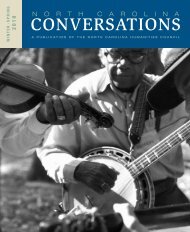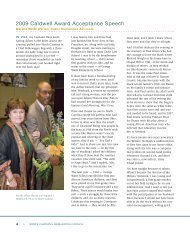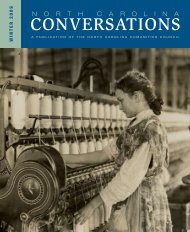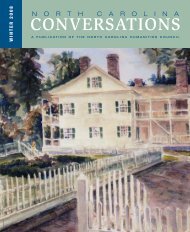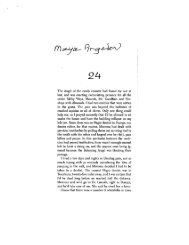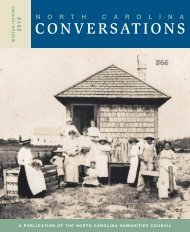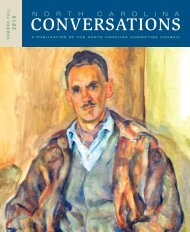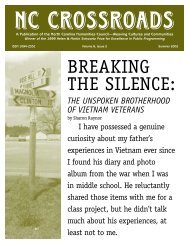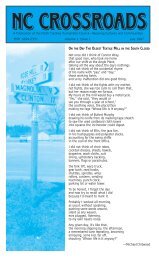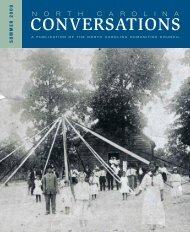North Carolina Conversations Summer-Fall 2008.pdf
North Carolina Conversations Summer-Fall 2008.pdf
North Carolina Conversations Summer-Fall 2008.pdf
- No tags were found...
Create successful ePaper yourself
Turn your PDF publications into a flip-book with our unique Google optimized e-Paper software.
Jonathan Robinson: Fisherman and Community LeaderInterview with Jonathan Robinson, Core Sound Waterfowl Museum’s Oral History CollectionWhen Jonathan Robinson speaks of commercial fishing, it is not only about something he has learned. It isabout something he has lived. The son of a commercial fishing family in the community of Atlantic, Robinson isa college graduate, former legislator in the NC House of Representatives, and currently a county commissionerfor the Down East area of Carteret County.Most proudly though, Robinson is a long-haul fisherman on Core Sound, part of the shared fishing grounds of<strong>North</strong> <strong>Carolina</strong>’s watermen. He is one of the fishermen who has roots generations deep in the shallow waterswhere he has worked his entire life. Robinson’s words speak to the deeper meaning of commercial fishing, itsplace in history, its connection to the people and this place, their hopes — and fears — for the future.We’re all kind of willing to sharewith each other. Maybe that comesfrom living in a sense of communityor being out on the water, the vastnessof the water. You’re dependenton one another. I’ve found that mostof the people who’ve fished for aliving will always readily share anyinformation they have. Anything I’veever learned about fishing I learnedit from a fellow fisherman whowillingly shared it with me. I thinkthere’s a camaraderie in the fisheriesthat doesn’t exist in some industries.Today there’s more and more demandon our coastal resources. There’sa certain appeal about living alongthe water and magnetism about theshore that draws people here. One ofthe biggest threats, I think, that thoseinvolved in the fisheries face will bethe loss of access to the water front.We need some immediate — notonly long-term — but immediate andshort-term efforts by the governmentand economic developers to ensureaccess not only for the fishermen, butfor the public along our waterways.Our founding fathers held our waterwaysas resources. I’ve had to liveunder the umbrella of the public trustdoctrine: that these resources belongto all the citizens of the state. Alongthat same line and under that samethought process, if the waterwaysbelong to the public then we need toprotect the public’s access to them.And that includes commercial access.The lingering question of the tidemenof <strong>North</strong> <strong>Carolina</strong> is: Is there goingto be a place here for us? Many ofus see the tidewater becoming aplayground for the rich and we feelthreatened by that. It’s a real threatbecause we’re all struggling hereto survive in trades that have beenpassed down to us by our fathers andhave served our communities. Part ofour character has been to welcomepeople here. I always thought itwas a virtue, but it seems like it hasbecome a liability.Fishermen Jonathan Robinson (left) and DarylStyron (right) sort fish at Quality Seafood onCedar Island. Quality Seafood (owned andoperated by Bradley Styron) is one of the fewfishhouses in Carteret County that works yearround. Photo by Susan Mason.NC <strong>Conversations</strong> • <strong>Summer</strong> 2008 • 11



